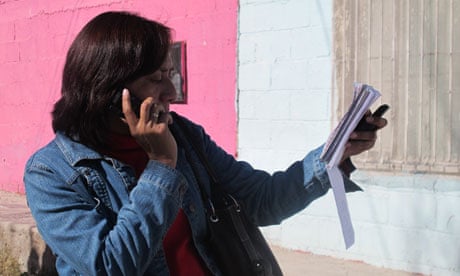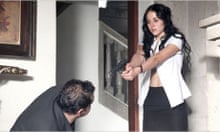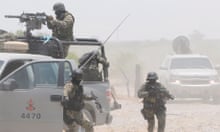In the Mexican border city of Ciudad Juárez, executions have become part of everyday life. More than 4,000 people – including teenagers and women – have been murdered in the city since 2008 – often in barbaric circumstances. Luz ("Lucy") Sosa, a 41-year-old mother of two and chief crime reporter on the city's main newspaper, El Diario, has documented each one of these assassinations.
But it was one brutal murder in 2008 – when Sosa's patch had become the frontline of Mexico's drug war – that the battle-weary journalist will never forget. Her El Diario colleague, Armando Rodriguez, was gunned down by masked assailants outside his home. He had been reporting on the city's drug cartels the previous day.
"The day before he was murdered we said goodbye as usual," she recalls, with a drawn-out sigh. "Like every day, we were discussing going for some drinks with other colleagues. I was at home when my boss called to tell me he'd been assassinated. I just couldn't believe it. I didn't expect that at all, even though there had been strong threats and aggression leading up to it."
Just weeks before Rodriguez's murder, a decapitated head was found carefully placed on a copy of El Diario in the city's busiest shopping plaza. The paper's front-page article bore Sosa's byline. "We should have seen this as a threat to the newspaper but we didn't," she says. "We didn't expect that anything would happen to us."
Sosa talks matter-of-factly about life in Juárez, where a routine day now involves writing about "one, five, seven or nine" murders. We speak through a translator, with Sosa in London to talk about Channel 4's Unreported World documentary on Mexico's ongoing drugs war to be broadcast on Friday, in which she features. Sosa – a journalist of 22 years with dark bronze hair, a gold crucifix necklace, and white-tipped polished nails – appears desensitised to the daily killings.
A "very heavy" day will see 20 murders, she says. Mercifully, that hasn't happened for a while, but two years ago such carnage was commonplace. More than 300 people were executed by the so-called Juárez death squads in September 2009 – the bloodiest month in the city's history.
Two of Sosa's colleagues on El Diario have been killed since the drugs war erupted on the paper's doorstep in 2008. A small flower sits on the desk where Luis Carlos Santiago, the 21-year-old photographer, used to work. He too was a victim of the death squads.
Sosa says it is becoming "harder and harder" to report from the city, just across the Rio Grande from Texas. "The situation is becoming worse and worse – there's an increase in armed vans. When the situation becomes more and more violent it becomes harder to operate as a journalist. In many places you can't report at all because they have placed bombs in media offices, they have kidnapped journalists."
However, threats of violence do not just come from shady drug lords. The city's federal police routinely intimidate journalists reporting on alleged links between the authorities and the drug gangs. Earlier this month, one of Sosa's colleagues had his phone confiscated by the federal police when reporting on a murder. Another was physically intimidated. "Sometimes it reaches the point where you receive death threats," she says. "That's part of daily life."
Sosa is reluctant to talk about the hazards of reporting from the city. But she does get animated when I ask whether – after four years of bloodshed – corruption is any closer to being exposed.
"There is no political will to eradicate the situation – many politicians benefit from it. It's profitable both to drug traffickers and to corrupt authorities. The situation could change if the government stopped thinking in these terms," she rails. "This is a war that has cost Mexico 40,000 lives so far. This is a war that none of the people wanted. This is a war of which the people have had enough. They don't want peace between both sides, they want the government to do their job and pursue the drug traffickers and bring them to justice. They want them to eradicate this drug problem."
Sosa claims to have never contemplated quitting her job, though she has written a will to ensure her son, 19, and daughter, 16, aren't "left destitute" if she is caught in the crossfire.
But the woman once described as the bravest in Mexico is quick to dismiss such inwardly-reflected thoughts. "I don't want to be a fatalist but I'm just being practical. I'm not the brave one, it's the newspaper as a whole – one of the most solid newspapers in the country – and I hope we can be a good example for a following generation of journalists."
Unreported World: Living with Hitmen is on Channel 4 on Friday 20 May at 7.35pm





Comments (…)
Sign in or create your Guardian account to join the discussion